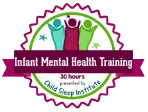Lately, I’ve had a lot of parents asking about toddler sleep habits. This is a busy time in your little one’s life in terms of growth and development, and good sleep is so important. Here’s the first in an occasional series of blogs on toddlers and sleep.
For your toddler, there’s probably nothing more exciting than a day at the park. With the slides, the swings, and the sandbox, there’s so much to see and do. It’s no surprise, then, that when it’s almost time to go home, you have to give your little one a 5-minute warning—without that time to wind down, you may have a meltdown on your hands.
It’s the same concept at bedtime. In this case, you are the park, and your toddler doesn’t want her time with you to end. Just as you wouldn’t abruptly pull her away from park play, you don’t want to say goodnight suddenly, or it could lead to tears and a frustrating experience for both of you. Take the idea of a “5-minute” warning and apply it at night in the form of a bedtime routine so both of you can get some sweet sleep.
What to Know About Toddler Sleep Habits
Before we jump into creating a routine, it’s helpful to understand where your toddler is at developmentally in relation to sleep. Your little one is growing fast and needs the mental, emotional, and physical support that comes from adequate sleep. Here’s a look at how much sleep children ages 1 to 5 should get in a 24-hour period:
- Ages 1 to 2 years: 11 to 14 hours
- Ages 3 to 5 years: 10 to 13 hours
Let’s break it down even further by age, and include naps in the sleep count:
- Ages 13 to 18 months: 1 to 2 naps (2.5 hours total)
- Ages 18 months to 2 ½ years: 1 nap (2.25 hours total)
- Ages 3 to 5 years: 1 nap (1.5 hours total)
There are some variables of course—for instance, toddlers typically drop their nap around age 4—but this is a good guide to get started on building a healthy sleep schedule.
Building a Bedtime Routine
The work of creating a successful bedtime routine for your toddler actually starts when she wakes up! That’s because you’ll use that wake-up time as the jumping-off point for her schedule. For instance, let’s say you have a 13-month-old who wakes up at 6:30 a.m., and you want her to get 13.5 hours of sleep in the 24 hours ahead. She takes two naps during the day, for a total of 2.5 hours, so you need to make sure she gets the remaining 11 hours of sleep at night. That means a 7:30 p.m. bedtime.
Now that you have a goal of 7:30 p.m., work backwards from there. What do you want to include in your toddler’s bedtime routine? If you usually give your child a bath, read a book, and have cuddle time, factor all that in to get a rough idea of how long the routine will be. If you figure the routine will last 30 minutes, start it at 7 p.m. Also, keep in mind there should be a long-enough wake window between the last nap of the day and bedtime; for toddlers it should be about 3 ½ to 4 hours. Otherwise, your little one won’t be sleepy enough to say goodnight.
Once you have a game plan, you can use the routine as your “5-minute warning” that the day is ending. It’s a gentle, loving cue for your little one to wind down and get ready for bed, and it creates a wonderful bonding opportunity between you both. You’ll both wake up refreshed for a new day—and another trip to the park!
If you need help establishing healthy sleep habits for your toddler, come to my Toddler Sleep Basics workshop. This 90-minute session is a great opportunity to ask your burning questions and gain valuable skills that will help your little one learn to sleep independently.
A 90-minute workshop for parents who thought their toddler would have started to fall asleep at bedtime unassisted by now. Do they still need help to fall asleep? Are you feeling stuck with how to get your toddler on a good bedtime routine and schedule? Do you have a “late-night visitor” in your bed, and you are not sure how to help your toddler sleep through the night? Are you wanting to co-sleep but don’t know how to help your toddler start the first few hours after bedtime on their own so you can have some time in the evening with your partner? Then this workshop is for you!
You will know what steps you need to take and acquire new skills to teach your toddler to fall asleep independently and sleep through the night. Learn more, select a date on our workshops calendar and register today.





Comments are closed.